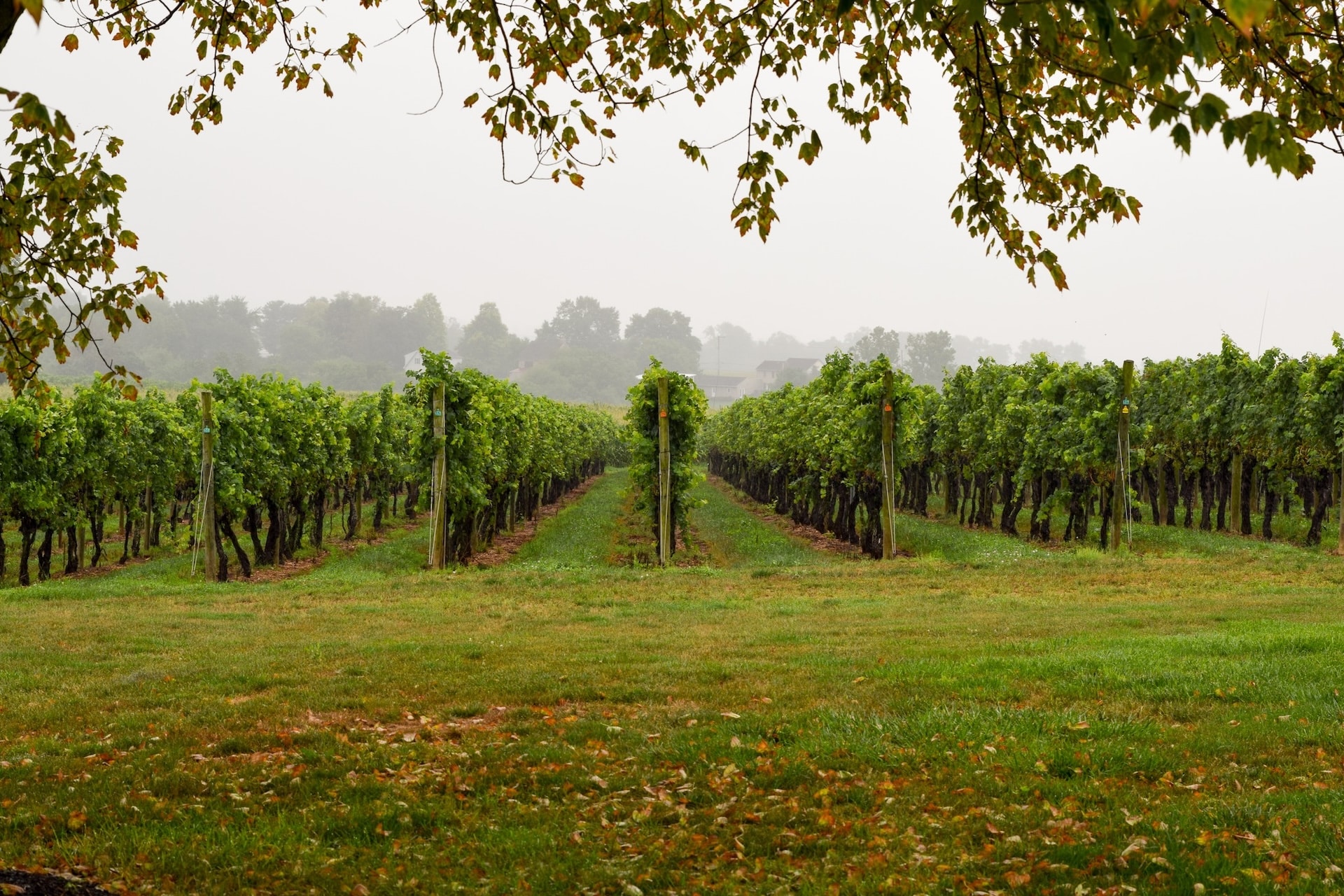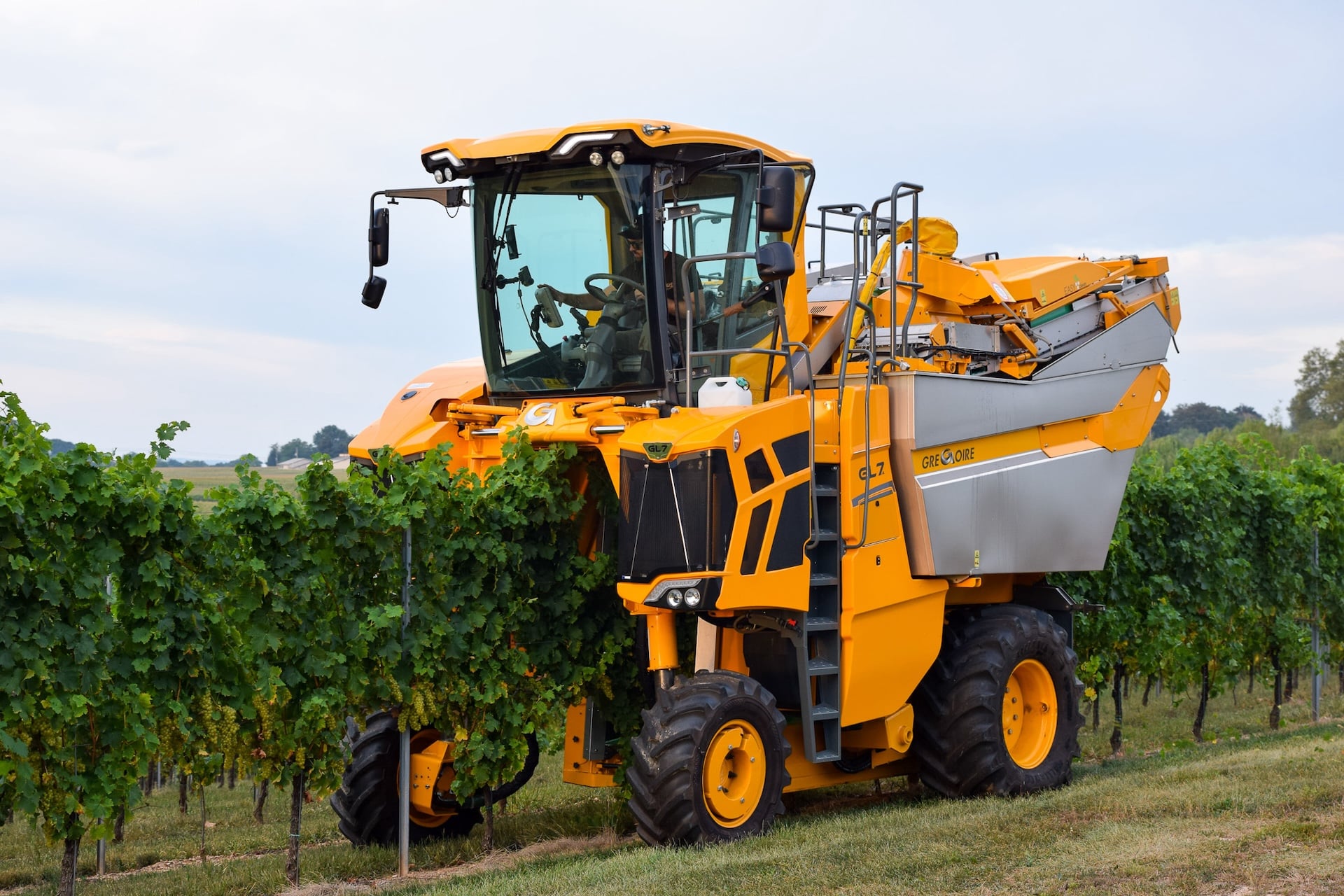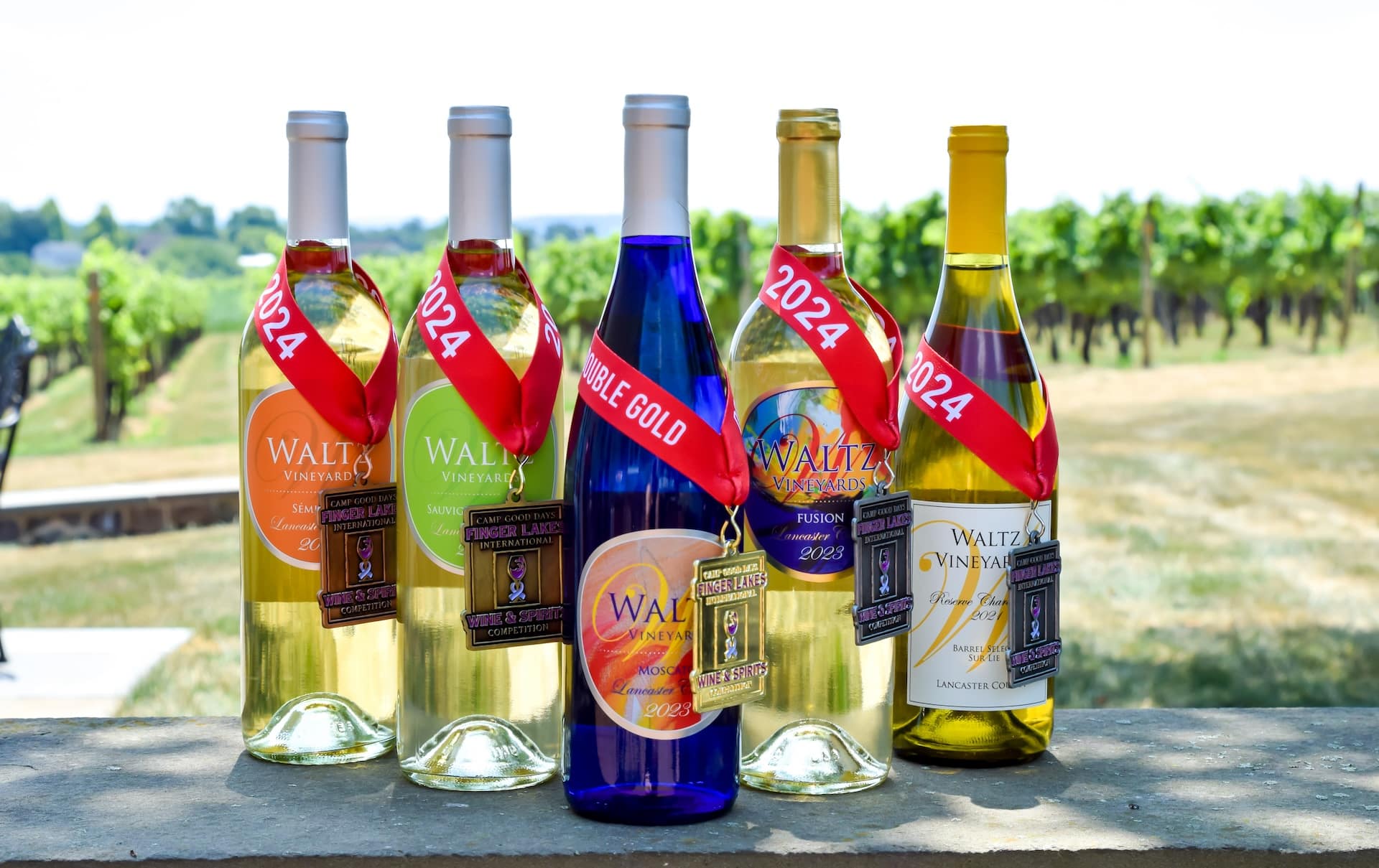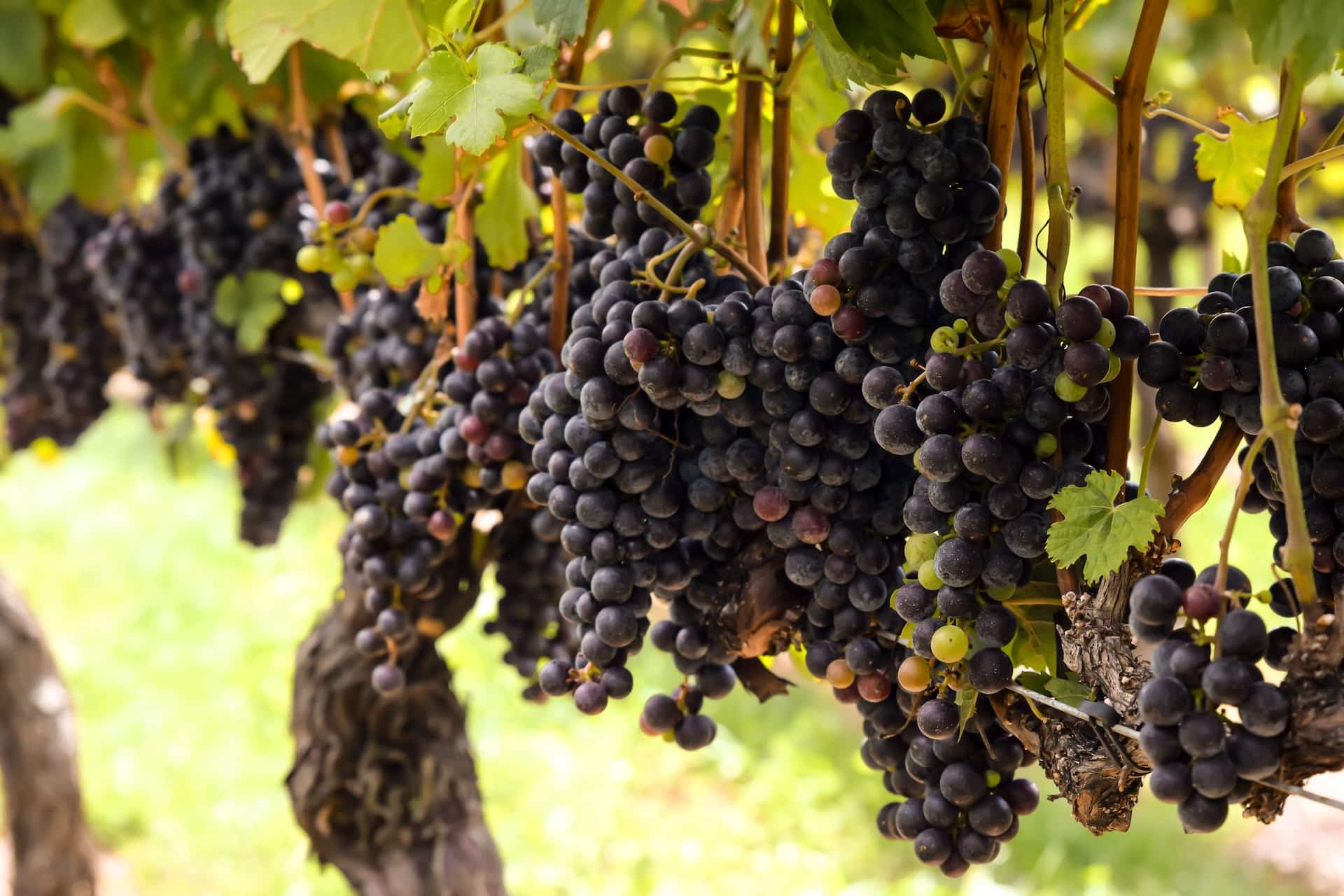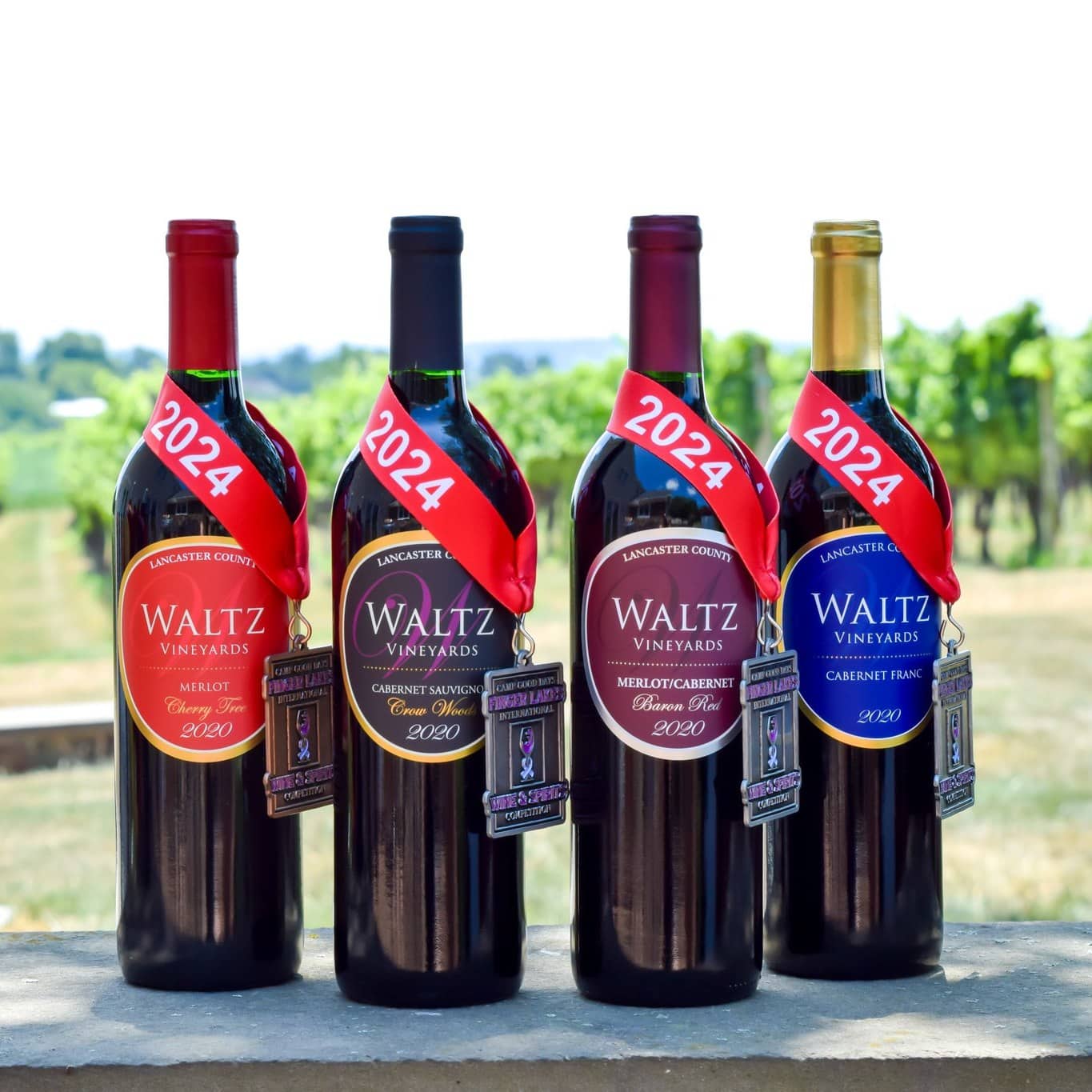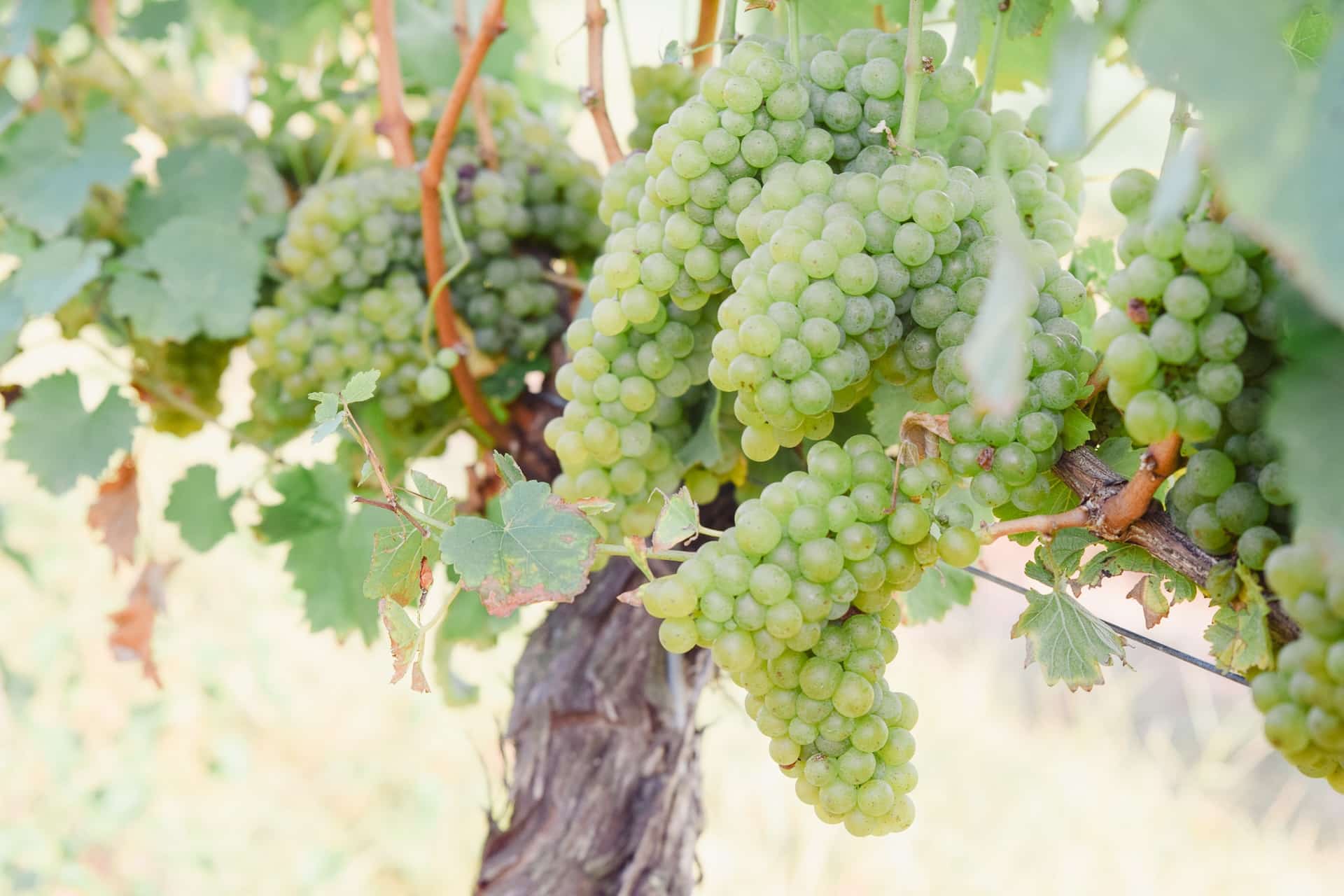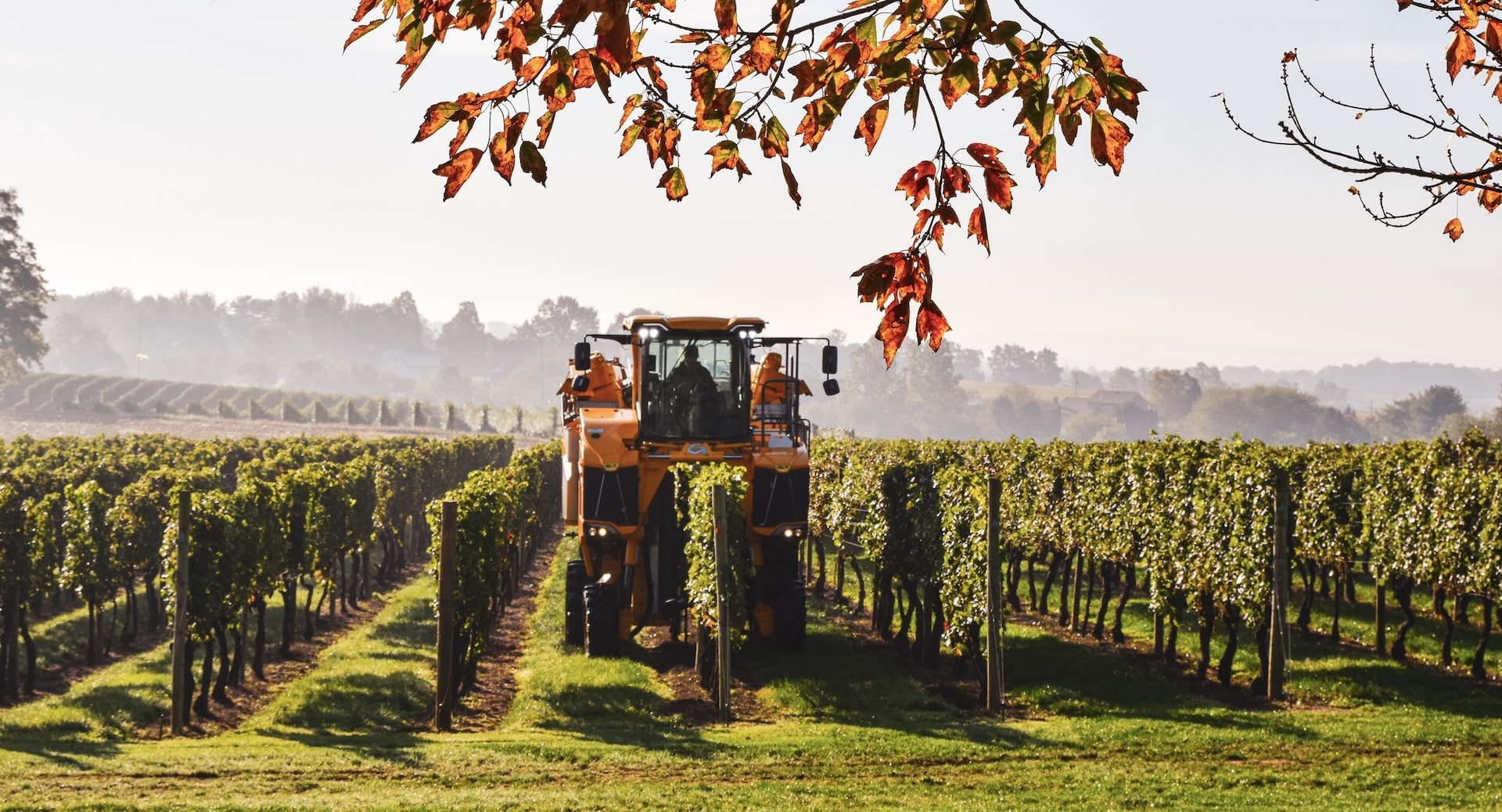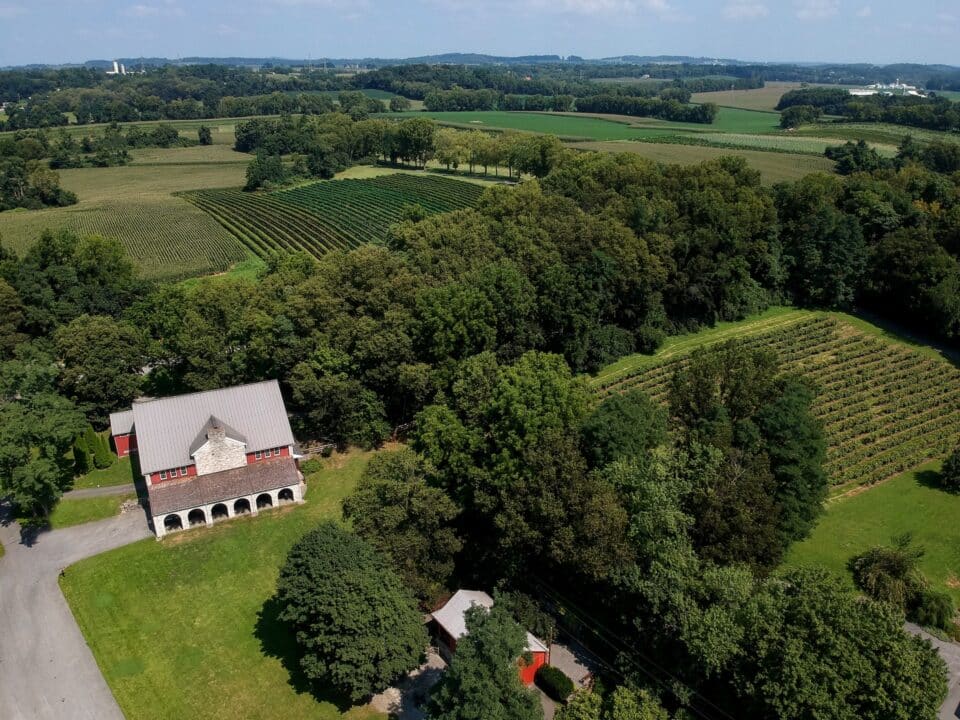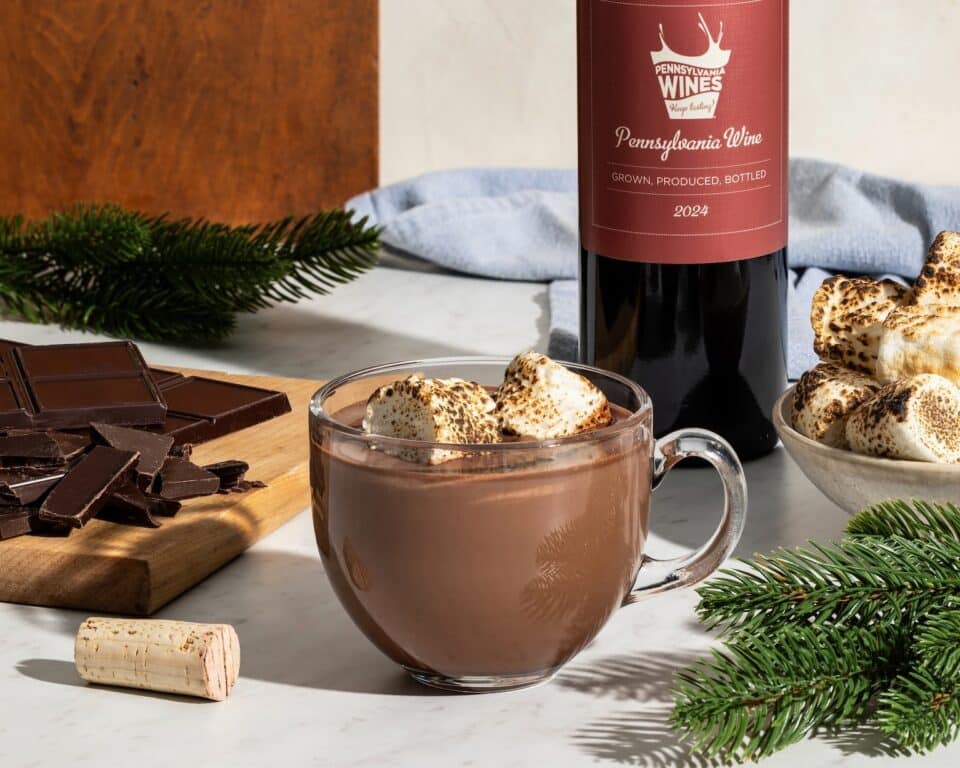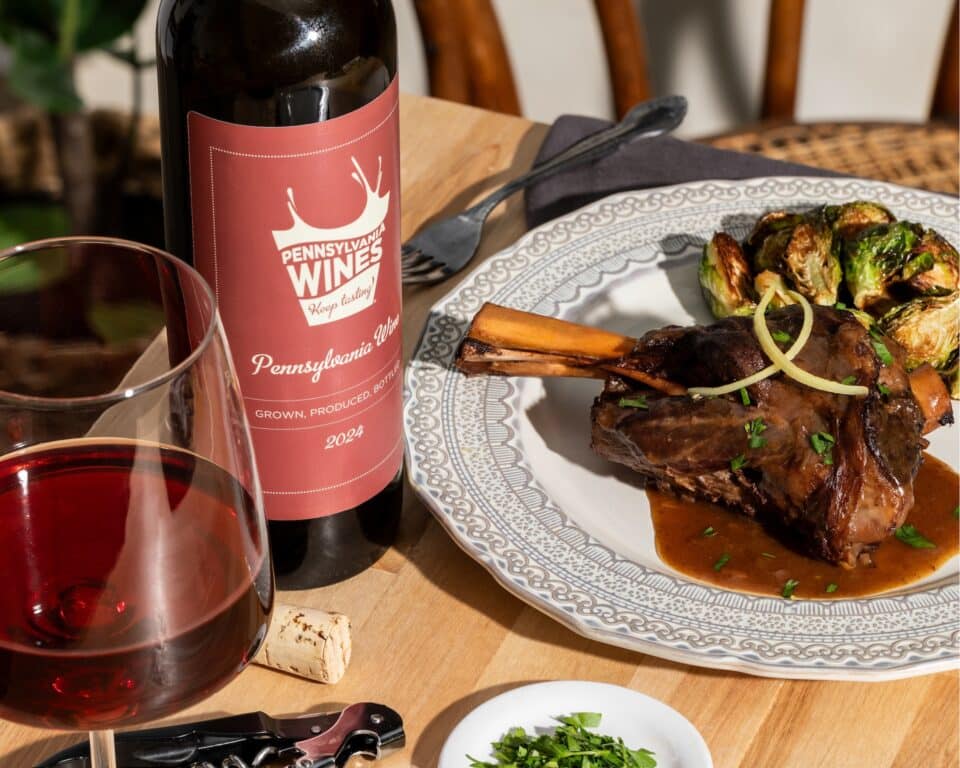The Waltz family is pushing the limits of Pennsylvania wine at their estate winery in Manheim. Founded on family farmland in 1997, the Waltz Vineyards Estate Winery produces exceptional European-style wines with grapes that thrive in its unique microclimate.
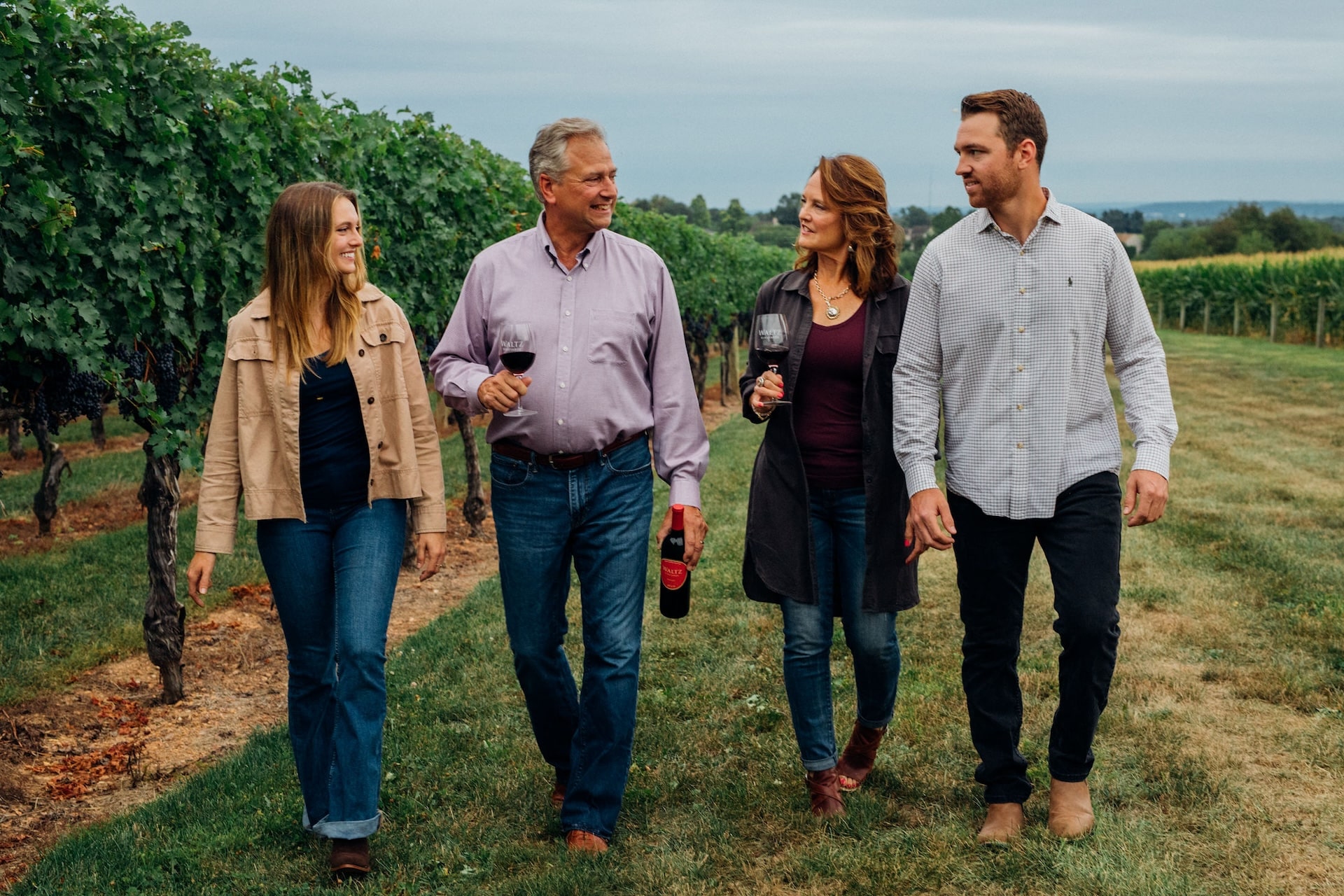
Lexe, Jan, Kimberly and Zach Waltz
We spoke with Zach Waltz, Director of Operations, about his path into the industry, the special qualities of winemaking in Lancaster County and future endeavors of Waltz Vineyards Estate Winery.
PA Eats: Can you share some of the background of Waltz Vineyards Estate Winery?
Zach Waltz: The farmland is now in the 7th generation, though not the business. It’s a little over 100 acres and it’s been a family farm in the family since the mid-1800s. Traditionally, we grew tobacco, which was the main cash crop here as in most of Lancaster County.
When my dad was about my age, in his 20s, he realized that tobacco and field crop prices didn’t seem sustainable. Farmers had to have second day jobs, and it didn’t seem sustainable if he wanted this farmland to be productive on its own and support a family.
He had an Agricultural degree from Penn State. He learned about soils and, on a trip to California in the mid 1990s, he thought, ‘Hey, our soils in Lancaster County are very similar to these California soils. I don’t see why we couldn’t grow the same grapes.’
He did research and reading and then planted the first grapes in 1997. It was a passion project, a hobby, that turned into a business very quickly. There was a lot of demand he wasn’t aware of from local wineries for high-quality fruit.
The first block was Cabernet Sauvignon and Merlot. Both of those are in high demand and hard to grow. One thing led to another and he planted more acreage and saw growing grapes as a business for him. Then, a few years down the road in the early 2000s, he saw a lot of awards that those wineries were winning with his fruit. He thought, ‘I guess the quality is pretty high here.’ He was just on the farming end, and didn’t know much about winemaking. It piqued his interest and he started winemaking in the garage with fruit.
My mom has her MBA. She said, ‘The only way I can raise four kids and apply my education is if I can work around the home.’ My dad said, ‘I can grow the grapes and make the wine if you can market the business and sell it.’ That’s how it evolved. In 2007, my parents built the winery right here at our home farm. She raised the kids and did the tasting room, and he grew the grapes and made the wine and it’s just kind of grown since, quite drastically.
Did you always know you’d take up the family business, or was it a winding road to that decision?
I was naturally inspired by my parents and by watching them build this from the ground up. I was born in 1997, the first year the vines were planted, so I literally grew up watching the vines grow and the business evolve.
I helped my dad in the business and grew a passion for it. I enjoyed the combination of outdoor work that has a creative, artistic side to it. It’s kind of a cool combo you don’t get in a lot of other agricultural industries.
By high school, I decided I definitely wanted to pursue this, but I felt a calling to do some higher education and not just go straight to working on the farm. I found a bachelor’s degree program focused on wine on the East Coast at Cornell. It’s the only one on the East Coast. I thought, ‘I’ll shoot my shot,’ and I got in, and did that. It’s a Bachelors of Science in Viticulture & Enology, kind of a dual major of the two, like a bachelors in winemaking.
What are some challenges and positives of growing and producing wine in PA?
As for challenges, I would say, we have a very humid climate here, compared to California, for example. That has brought the potential for diseases and pests that we have to manage in the vineyard.
On the winemaking side, we’re out on our own here as it’s not an established wine area. We’re really collaborative with a few winemakers growing similar varieties and using similar equipment. We have to have a very collaborative environment to share what we’re learning, share equipment, taste each other’s wine and critique them. We’ve seen a lot of growth in quality over the last few years, by having that.
As for positives, we’ve been pleasantly surprised by the quality of the wine we’re able to grow here. There are things that take years to figure out and perfect, but we now have 20 years of experience. We’ve scored very well in many international competitions. They’re blind competitions that stack us up against French wines and European wines, so I think those results speak for themselves.
I think it’s important to point out what makes us unique and why we can grow wines of that caliber. Obviously, the Lancaster County area is known for great soil. The soil is very well drained here, with a high shale content, which enables all that extra rainfall to drain away from the vines. We’re at over 600 feet elevation, which is also a pretty big factor.
At a recent conference, I had to present on what makes us unique here, and it really does come down to the microclimate. Looking at historical data, the average rainfall, average temperature, and our soil, the accumulated combination shows how a very small area here is much more suitable for growing grapes than the rest of the state.
Have you had any particular challenges or victories in winemaking?
People can relate to the lantern flies. It’s been kind of an epidemic for the wine industry. I want to say it was 2020 that it really kicked off for us. At first, people thought it could be the end of the wine industry because we heard of industries to the east getting decimated by these bugs. It was terrifying. Fortunately, it turned into a positive story.
There was a lot of collaboration between growers, Penn State and Cornell. We were able to find ways to manage them. The fears are mitigated and there’s hope we can move past the issue.
Many people don’t know this, but out of all the plants they can feed on, their absolute favorite is grape vines and they can devastate a vineyard if you don’t manage it.
Can you tell us a little bit about Waltz Vineyards’ wines?
Our claim to fame is dry reds. We’ve been able to fully ripe Cabernet Sauvignon and Cabernet Franc on a consistent basis, and that’s very hard to do in Pennsylvania.
One other thing we do is grow some unique varieties. We grow Sémillon and Moscato. We’ve become pretty confident in our site and its ability to grow and ripen non-traditional varieties for the area and ones you’d normally associate with warmer climates.
Part of that is somewhat trying to break the stereotype of Pennsylvania wine: ‘Here are wines you’d think could never be grown here. Here are examples of what we can do.’
Waltz has so many local connections to surrounding restaurants, breweries, venues and other businesses. How did that become such a significant part of the business?
We’re very fortunate to be in an area where people are very used to supporting local business. There’s a lot of collaboration with restaurants and breweries, and they want to support us. They’re saying, ‘Our customers also want to drink wine. Are we going to choose something mass produced or do we want a local product, hand delivered with quality that is consistent?’ It’s a two-way street.
A lot of it is the state laws, which I may not always like, but this one works out well. Breweries, distilleries and wineries can only sell what’s produced within the state. They can’t go out and sell a mass-produced product. I want to say it was a Governor Wolf initiative about five or six years ago. It’s a multi-beneficial relationship there. If you put yourself in the shoes of a brewery that wants to sell wine and spirits, you have to source from within the state.
How do you personally evolve and stay connected in the industry?
Recently, I’ve done quite a few presentations at trade shows throughout the U.S. I’ve presented on different French oak trials at a conference in Santa Rosa, CA. I presented on calcium issues in our soil at a trade show in Syracuse, NY.
Aside from those trade shoes and research, I travel internationally to learn from other regions growing similar varieties about how they’re adapting to climate change and how they’re improving their operations.
Italy has been a big one for us. We have similar varieties and similar equipment, so I’ve been there multiple times to learn. I really enjoy central Italy, around the Rome area in a few regions where our Italian consultant is located. I’ve spent quite a bit of time in the Abruzzo area.
What are some industry trends you’re seeing?
There are some good and some scary trends out there for sure. The scariest is this push for zero alcohol. People are just abstaining. From a health perspective and for quality of life, I totally get it. From a business perspective, that’s kind of threatening, and a tough one to balance. The supply of wine is ever growing and the consumer demand seems to be shrinking, which leads to problems.
But I would say I still have hope because items like wine are that happy medium. It’s been around forever and it’s weathered a lot of storms. You ‘ll see a lot of phases with mixed cocktails or canned cocktails, but they seem to have their phases and go away. Wines have always been here.
What do you see on the horizon for Waltz Vineyards?
We’re definitely moving into the sparkling wine phase. We came out with our first sparkling Chardonnay this year and we’ll expand to sparkling Rosé. Sparkling is the only product category that’s increasing in demand.
Another thing is that some friends from college and I are actively looking at producing low- and no-alcohol wines. It’s not an easy thing to make a wine that tastes good without any alcohol, but it’s possible, so that’s in the works.
Anything else you’d like to add?
One thing we’ve grown passionate about is the preservation of farmland. It’s what most people who live here say is their favorite part about living here. It’s important for people to understand the importance of grapes and perennial crops in that preservation.
When you plant an acre of grapes, you’re basically securing that land for generations. Securing local wineries is a huge way of preserving lots of farmland. While grain farmers are really getting squeezed, our business model is less incentivized to sell out to an investor because we have this long-term investment in the grapevines.
To learn more about Waltz Vineyards Estate Winery, head to its website where you can shop its collection of wines, learn more about its wine club and peruse its local partnerships. You can also stay in the loop by following its Facebook and Instagram pages.
Visit the winery tasting room at 1599 Old Line Rd., Manheim; (717) 664-9463 and its Wine Shop at Kitchen Kettle Village at 3529 Old Philadelphia Pike, Intercourse; (717) 929-0275.
The PA Vines & Wines series was created in collaboration with the Pennsylvania Wine Association with Round 8, Act 39 grant funding from the Pennsylvania Liquor Control Board (PLCB).
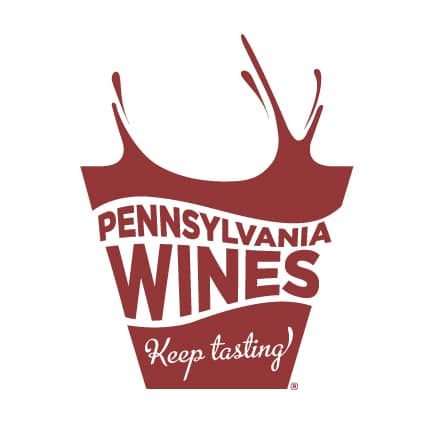
The Pennsylvania Winery Association (PWA) is a trade association that markets and advocates for the limited licensed wineries in Pennsylvania.
- Photos: Waltz Vineyards Estate Winery
